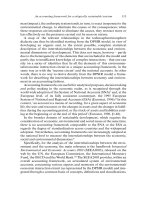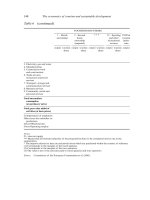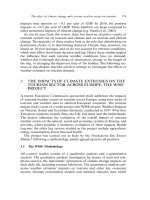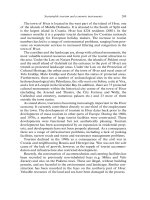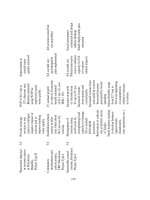Inequality and power the economics of class
Bạn đang xem bản rút gọn của tài liệu. Xem và tải ngay bản đầy đủ của tài liệu tại đây (1.58 MB, 232 trang )
Inequality and Power
This book is about the causes and consequences of economic inequality in the advanced market
economies of today. It is commonplace that in market systems people choose their own individual
economic destinies, but of course the choices people make are importantly determined by the
alternatives available to them: economic disparity arises mainly from unequal opportunity. Yet this
merely begs the question; from whence do the vast existing inequalities of opportunity arise? This
book theorizes power and social class as the real crux of economic inequality.
Most of mainstream economics studiously eschews questions involving social power, preferring
to focus instead on “individual choice subject to constraint” in contexts of “well-functioning
markets”. Yet both “extra-market” power structures and power structures arising from within the
market system itself are unavoidably characteristic of real-world market-based economies. The
normal working of labor and financial markets engenders an inherent wealth-favoring bias in the
distribution of opportunities for occupational choice. That bias is greatly compounded by the
economic, social, political and cultural power structures that constitute the class system. Those
power structures work to distribute economic benefit to class elites, and are in turn undergirded by
the disparities of wealth they thus help engender.
Inequality and Power offers an economic analysis of the power structures constituting that class
system: employers’ power over employees; the power of certain businesses over others;
professionals’ power over their clients and other employees; cultural power in the media and
education systems; and political power in “democratic” government. Schutz argues that a “class
analysis” of the trend of increasing economic inequality today is superior to the mainstream economic
analysis of that trend. After considering what is wrong with power-based inequality in term of
criteria of distributive justice and economic functionality, the book concludes with an outline of
various possible correctives.
This book should be of interest to students and researchers in economics, sociology, political
science and philosophy, as well as anyone interested in theories of social class.
Eric A. Schutz is a Professor of Economics at Rollins College, USA.
Routledge frontiers of political economy
1 Equilibrium Versus
Understanding
Towards the rehumanization of
economics within social theory
Mark Addleson
2 Evolution, Order and
Complexity
Edited by Elias L. Khalil and
Kenneth E. Boulding
3 Interactions in Political
Economy
Malvern after ten years
Edited by Steven Pressman
4 The End of Economics
Michael Perelman
5 Probability in Economics
Omar F. Hamouda and
Robin Rowley
6 Capital Controversy, Post
Keynesian Economics and the
History of Economics
Essays in honour of
Geoff Harcourt, volume one
Edited by Philip Arestis,
Gabriel Palma and
Malcolm Sawyer
7 Markets, Unemployment and
Economic Policy
Essays in honour of
Geoff Harcourt, volume two
Edited by Philip Arestis,
Gabriel Palma and
Malcolm Sawyer
8 Social Economy
The logic of capitalist
development
Clark Everling
9 New Keynesian Economics/Post
Keynesian Alternatives
Edited by Roy J. Rotheim
10 The Representative Agent in
Macroeconomics
James E. Hartley
11 Borderlands of Economics
Essays in honour of
Daniel R. Fusfeld
Edited by Nahid Aslanbeigui and
Young Back Choi
12 Value, Distribution and Capital
Essays in honour of
Pierangelo Garegnani
Edited by Gary Mongiovi and
Fabio Petri
13 The Economics of Science
Methodology and epistemology as
if economics really mattered
James R. Wible
14 Competitiveness, Localised
Learning and Regional
Development
Specialisation and prosperity in
small open economies
Peter Maskell, Heikki Eskelinen,
Ingjaldur Hannibalsson,
Anders Malmberg and Eirik Vatne
15 Labour Market Theory
A constructive reassessment
Ben J. Fine
16 Women and European
Employment
Jill Rubery, Mark Smith,
Colette Fagan and
Damian Grimshaw
17 Explorations in Economic
Methodology
From Lakatos to empirical
philosophy of science
Roger Backhouse
18 Subjectivity in Political
Economy
Essays on wanting and choosing
David P. Levine
19 The Political Economy of
Middle East Peace
The impact of competing trade
agendas
Edited by J.W. Wright, Jnr
20 The Active Consumer
Novelty and surprise in consumer
choice
Edited by Marina Bianchi
21 Subjectivism and Economic
Analysis
Essays in memory of
Ludwig Lachmann
Edited by Roger Koppl and
Gary Mongiovi
22 Themes in Post-Keynesian
Economics
Essays in honour of
Geoff Harcourt, volume three
Edited by Claudio Sardoni and
Peter Kriesler
23 The Dynamics of Technological
Knowledge
Cristiano Antonelli
24 The Political Economy of Diet,
Health and Food Policy
Ben J. Fine
25 The End of Finance
Capital market inflation, financial
derivatives and pension fund
capitalism
Jan Toporowski
26 Political Economy and the New
Capitalism
Edited by Jan Toporowski
27 Growth Theory
A philosophical perspective
Patricia Northover
28 The Political Economy of the
Small Firm
Edited by Charlie Dannreuther
29 Hahn and Economic
Methodology
Edited by Thomas Boylan and
Paschal F. O’Gorman
30 Gender, Growth and Trade
The miracle economies of the
postwar years
David Kucera
31 Normative Political Economy
Subjective freedom, the market
and the state
David Levine
32 Economist with a Public Purpose
Essays in honour of
John Kenneth Galbraith
Edited by Michael Keaney
33 Involuntary Unemployment
The elusive quest for a theory
Michel De Vroey
34 The Fundamental Institutions of
Capitalism
Ernesto Screpanti
35 Transcending Transaction
The search for self-generating
markets
Alan Shipman
36 Power in Business and the State
An historical analysis of its
concentration
Frank Bealey
37 Editing Economics
Essays in honour of Mark Perlman
Edited by Hank Lim,
Ungsuh K. Park and
Geoff Harcourt
38 Money, Macroeconomics and
Keynes
Essays in honour of Victoria
Chick, volume one
Edited by Philip Arestis,
Meghnad Desai and Sheila Dow
39 Methodology, Microeconomics
and Keynes
Essays in honour of
Victoria Chick, volume two
Edited by Philip Arestis,
Meghnad Desai and Sheila Dow
40 Market Drive and Governance
Reexamining the rules for
economic and commercial contest
Ralf Boscheck
41 The Value of Marx
Political economy for
contemporary capitalism
Alfredo Saad-Filho
42 Issues in Positive Political
Economy
S. Mansoob Murshed
43 The Enigma of Globalisation
A journey to a new stage of
capitalism
Robert Went
44 The Market
Equilibrium, stability, mythology
S.N. Afriat
45 The Political Economy of Rule
Evasion and Policy Reform
Jim Leitzel
46 Unpaid Work and the Economy
Edited by Antonella Picchio
47 Distributional Justice
Theory and measurement
Hilde Bojer
48 Cognitive Developments in
Economics
Edited by Salvatore Rizzello
49 Social Foundations of Markets,
Money and Credit
Costas Lapavitsas
50 Rethinking Capitalist
Development
Essays on the economics of
Josef Steindl
Edited by Tracy Mott and
Nina Shapiro
51 An Evolutionary Approach to
Social Welfare
Christian Sartorius
52 Kalecki’s Economics Today
Edited by Zdzislaw L. Sadowski
and Adam Szeworski
53 Fiscal Policy from Reagan to
Blair
The left veers right
Ravi K. Roy and Arthur T. Denzau
54 The Cognitive Mechanics of
Economic Development and
Institutional Change
Bertin Martens
55 Individualism and the Social
Order
The social element in liberal
thought
Charles R. McCann Jnr
56 Affirmative Action in the United
States and India
A comparative perspective
Thomas E. Weisskopf
57 Global Political Economy and
the Wealth of Nations
Performance, institutions,
problems and policies
Edited by Phillip Anthony O’Hara
58 Structural Economics
Thijs ten Raa
59 Macroeconomic Theory and
Economic Policy
Essays in honour of
Jean-Paul
Fitoussi
Edited by K. Vela Velupillai
60 The Struggle over Work
The “end of work” and
employment alternatives in
post-industrial
societies
Shaun Wilson
61 The Political Economy of Global
Sporting Organisations
John Forster and Nigel Pope
62 The Flawed Foundations of
General Equilibrium Theory
Critical essays on economic theory
Frank Ackerman and
Alejandro Nadal
63 Uncertainty in Economic Theory
Essays in honor of
David Schmeidler’s 65th birthday
Edited by Itzhak Gilboa
64 The New Institutional
Economics of Corruption
Edited by Johann Graf Lambsdorff,
Markus Taube and
Matthias Schramm
65 The Price Index and its Extension
A chapter in economic
measurement
S.N. Afriat
66 Reduction, Rationality and
Game Theory in Marxian
Economics
Bruce Philp
67 Culture and Politics in
Economic Development
Volker Bornschier
68 Modern Applications of
Austrian Thought
Edited by Jürgen G. Backhaus
69 Ordinary Choices
Individuals, incommensurability,
and democracy
Robert Urquhart
70 Labour Theory of Value
Peter C. Dooley
71 Capitalism
Victor D. Lippit
72 Macroeconomic Foundations of
Macroeconomics
Alvaro Cencini
73 Marx for the 21st Century
Edited by Hiroshi Uchida
74 Growth and Development in the
Global Political Economy
Social structures of accumulation
and modes of regulation
Phillip Anthony O’Hara
75 The New Economy and
Macroeconomic Stability
A neo-modern
perspective
drawing on the complexity
approach and Keynesian
economics
Teodoro Dario Togati
76 The Future of Social Security
Policy
Women, work and a citizens’
basic income
Ailsa McKay
77 Clinton and Blair
The political economy of the third
way
Flavio Romano
78 Marxian Reproduction Schema
Money and aggregate demand in a
capitalist economy
A.B. Trigg
79 The Core Theory in Economics
Problems and solutions
Lester G. Telser
80 Economics, Ethics and the
Market
Introduction and applications
Johan J. Graafland
81 Social Costs and Public Action
in Modern Capitalism
Essays inspired by
Karl William Kapp’s theory of
social costs
Edited by Wolfram Elsner,
Pietro Frigato and
Paolo Ramazzotti
82 Globalization and the Myths of
Free Trade
History, theory and empirical
evidence
Edited by Anwar Shaikh
83 Equilibrium in Economics
Scope and limits
Edited by Valeria Mosini
84 Globalization
State of the art and perspectives
Edited by Stefan A. Schirm
85 Neoliberalism
National and regional experiments
with global ideas
Edited by Ravi K. Roy,
Arthur T. Denzau and
Thomas D. Willett
86 Post-Keynesian
Macroeconomics
Essays in honour of Ingrid Rima
Edited by Mathew Forstater,
Gary Mongiovi and
Steven Pressman
87 Consumer Capitalism
Anastasios S. Korkotsides
88 Remapping Gender in the New
Global Order
Edited by Marjorie Griffin Cohen
and Janine Brodie
89 Hayek and Natural Law
Eric Angner
90 Race and Economic
Opportunity in the Twenty-First
Century
Edited by Marlene Kim
91 Renaissance in Behavioural
Economics
Harvey Leibenstein’s impact on
contemporary economic analysis
Edited by Roger Frantz
92 Human Ecology Economics
A new framework for global
sustainability
Edited by Roy E. Allen
93 Imagining Economics Otherwise
Encounters with identity/difference
Nitasha Kaul
94 Reigniting the Labor Movement
Restoring means to ends in a
democratic labor movement
Gerald Friedman
95 The Spatial Model of Politics
Norman Schofield
96 The Economics of American
Judaism
Carmel Ullman Chiswick
97 Critical Political Economy
Christian Arnsperger
98 Culture and Economic
Explanation
Economics in the US and Japan
Donald W. Katzner
99 Feminism, Economics and
Utopia
Time travelling through
paradigms
Karin Schönpflug
100 Risk in International Finance
Vikash Yadav
101 Economic Policy and
Performance in Industrial
Democracies
Party governments, central banks
and the fiscal–monetary policy
mix
Takayuki Sakamoto
102 Advances on Income Inequality
and Concentration Measures
Edited by Gianni Betti and
Achille Lemmi
103 Economic Representations
Academic and everyday
Edited by David F. Ruccio
104 Mathematical Economics and
the Dynamics of Capitalism
Goodwin’s legacy continued
Edited by Peter Flaschel and
Michael Landesmann
105 The Keynesian Multiplier
Edited by Claude Gnos and
Louis-Philippe
Rochon
106 Money, Enterprise and Income
Distribution
Towards a macroeconomic
theory of capitalism
John Smithin
107 Fiscal Decentralization and
Local Public Finance in Japan
Nobuki Mochida
108 The “Uncertain” Foundations
of Post-Keynesian
Economics
Essays in exploration
Stephen P. Dunn
109 Karl Marx’s Grundrisse
Foundations of the critique of
political economy 150 years later
Edited by Marcello Musto
110 Economics and the Price Index
S.N. Afriat and Carlo Milana
111 Sublime Economy
On the intersection of art and
economics
Edited by Jack Amariglio,
Joseph W. Childers and
Stephen E. Cullenberg
112 Popper, Hayek and the Open
Society
Calvin Hayes
113 The Political Economy of Work
David Spencer
114 Institutional Economics
Bernard Chavance
115 Religion, Economics and
Demography
The effects of religion on
education, work, and the family
Evelyn L. Lehrer
116 Economics, Rational Choice
and Normative Philosophy
Edited by Thomas A. Boylan and
Ruvin Gekker
117 Economics Versus Human
Rights
Manuel Couret Branco
118 Hayek Versus Marx and
Today’s Challenges
Eric Aarons
119 Work Time Regulation as
Sustainable Full Employment
Policy
Robert LaJeunesse
120 Equilibrium, Welfare and
Uncertainty
Mukul Majumdar
121 Capitalism, Institutions and
Economic Development
Michael Heller
122 Economic Pluralism
Robert Garnett, Erik Olsen and
Martha Starr
123 Dialectics of Class Struggle in
the Global Economy
Clark Everling
124 Political Economy and
Globalization
Richard Westra
125 Full-Spectrum
Economics
Toward an inclusive and
emancipatory social science
Christian Arnsperger
126 Computable, Constructive and
Behavioural Economic
Dynamics
Essays in honour of
Kumaraswamy (Vela) Velupillai
Stefano Zambelli
127 Monetary Macrodynamics
Toichiro Asada, Carl Chiarella,
Peter Flaschel and
Reiner Franke
128 Rationality and Explanation in
Economics
Maurice Lagueux
129 The Market, Happiness, and
Solidarity
A Christian perspective
Johan J. Graafland
130 Economic Complexity and
Equilibrium Illusion
Essays on market instability and
macro vitality
Ping Chen
131 Economic Theory and Social
Change
Problems and revisions
Hasse Ekstedt and Angelo Fusari
132 The Practices of Happiness
Political economy, religion and
wellbeing
Edited by John Atherton,
Elaine Graham and
Ian Steedman
133 The Measurement of
Individual Well-Being
and
Group Inequalities
Essays in memory of
Z.M. Berrebi
Edited by Joseph Deutsch and
Jacques Silber
134 Wage Policy, Income
Distribution, and Democratic
Theory
Oren M. Levin-Waldman
135 The Political Economy of
Bureaucracy
Steven O. Richardson
136 The Moral Rhetoric of Political
Economy
Justice and modern economic
thought
Paul Turpin
137 Macroeconomic Regimes in
Western Industrial Countries
Hansjörg Herr and
Milka Kazandziska
138 The Political Economy of the
Environment
Edited by Simon Dietz,
Jonathan Michie and
Christine Oughton
139 Business Ethics and the
Austrian Tradition in
Economics
Hardy Bouillon
140 Inequality and Power
The economics of class
Eric A. Schutz
Inequality and Power
The economics of class
Eric A. Schutz
First published 2011
by Routledge
2 Park Square, M ilton Park, Abingdon, Oxon OX14 4RN
Simultaneously published in the USA and Canada
by Routledge
711 Third Avenue, New York, NY 10017
Routledge is an imprint of the Taylor & Francis Group, an informa business
© 2011 Eric A. Schutz
The right of Eric A. Schutz to be identified as author of the editorial material, and of the authors for their individual chapters, has been asserted in accordance with
sections 77 and 78 of the Copyright, Designs and Patents Act 1988.
All rights reserved. No part of this book may be reprinted or reproduced or utilized in any form or by any electronic, mechanical, or other means, now known or
hereafter invented, including photocopying and recording, or in any information storage or retrieval system, without permission in writing from the publishers.
Trademark notice: Product or corporate names may be trademarks or registered trademarks, and are used only for identification and explanation without intent to
infringe.
British Library Cataloguing in Publication Data
Schutz, Eric A., 1947–
Inequality and power: the economics of class/by Eric A. Schutz.
p. cm.
Includes bibliographical references and index.
1. United States–Social conditions. 2. Social classes–Economic aspects–
United States. 3. Equality–Economic aspects–United States. 4. Power
(Social sciences)–Economic aspects–United States. I. Title.
HN65.S4295 2011
305.5’10973--dc22
2010038761
Library of Congress Cataloging in Publication Data
A catalog record for this book has been requested
ISBN: 978-0-415-55480-0 (hbk)
ISBN: 978-0-203-82887-8 (ebk)
Contents
Acknowledgments
1 Introduction
2 People make their choices
3 Opportunity matters
4 Opportunity matters: more yet
5 How power works
6 Capitalism: “classical” class
7 Realities of class today
8 Running the system: business power and political power
9 Cultural power
10 Increasing inequality today
11 Confronting inequality and class: distributive justice
12 Confronting inequality and class: economy, community and biosphere
13 Conclusion
Notes
Bibliography
Index
Acknowledgments
I wish to thank Ed Royce, friend and comrade, without whose steady encouragement and keen critical
eye I certainly could not have finished this book. I wish to thank also Jose Galvez for his many
insightful comments and his hard work on a fair amount of the nitty-gritty. My colleague Chris Skelley
was helpful above and beyond the call. Thanks also to my colleague Rob Steen. And thanks to the
Rollins College Office of the Dean of Faculty for a Full-Year Research Stipend and an office on
campus that enabled me to complete this work.
1 Introduction
The recent trend of increasing economic inequality in the U.S. is by now universally acknowledged,
yet certain critical aspects of it apparently remain proscribed from mainstream public discussion.
Liberal commentators rightly lament increasing inequality as an injustice and a rising threat to
democracy, while conservatives, having given up trying to disprove it is happening, argue it is not a
serious matter. For both, discussion of the real heart of the issue of inequality, the problem of class, is
mostly avoided as a kind of taboo. This book is offered in the hope that readers’ understanding of this
momentous trend, and of the larger history of inequality in modern market societies generally, may be
clarified by looking closely at that mostly unspoken problem of class.
Great inequality such as that seen in the U.S. today is not historically unusual. In the relatively
egalitarian post-World War II period up to the late 1970s, it was not true that “the rich got richer, the
poor got poorer”: all income groups’ standards of living rose about equally. Yet the U.S. was
anything but exemplary even then, despite its own popular self-congratulatory mythology. Many
Americans saw their society as one that did not need the kind of draconian and largely self-defeating
approach toward real, egalitarian democracy taken by its arch-rival, the Soviet Union – they felt the
U.S. was already a society of equals in freedom. But from the viewpoint of many of its post-war
allied nations, this was pure pretension, for the European social democracies were making genuine
and successful efforts toward the real thing. Today, as the American experience of a rising disparity
between the rich and the rest progresses, the old pretension of America as a “classless society” is
rapidly losing its appeal.
However, that is no thanks to the mainstream of public commentary on the subject. The fact that
economic inequality has been discussed at all in the mainstream today is some indication of its
seriousness, given that discussion of the subject was basically non-existent in the U.S. for decades.
But as welcome as it may be, mainstream media commentary on the issue is narrow and shallow,
effectively downplaying some of the most important ramifications of rising inequality, and reducing
the concept of class itself to something harmless and apparently not greatly interesting alongside the
main currents of the American experience today. The perspective of this book, by contrast, highlights
economic inequality of the kind seen throughout American history all the way up to the present as
essentially manifesting the reality of social class. More critically, it acknowledges class itself to be
the worst possible violation of those aspirations of democracy that are proclaimed so much a part of
this culture.
What precisely is class? It is a division of society into strata defined by positions of power or
relative powerlessness for those occupying them. While some mainstream commentators might





